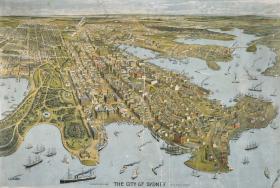Locating places: pictorial maps
Key inquiry question #1
What are places like?
Content Summary
Locating Places
Students:
- investigate how the location of places can be represented, for example: (ACHGK001)
- location of familiar and local places on maps.
- description of the location of places.
Background Notes for Teachers
The focus of these acitivities is on developing an understanding of the features and uses of pictorial maps and using the language of position to describe location.
Pictorial maps are a geographical tool that can be used to represent data in geographical inquiries. A pictorial map is defined by the NSW Geography k-10 syllabus as 'a map using illustrations to represent information on a map'. Pictorial maps are usually represented from a birds eye view or from a slanted angle.
Positional language includes: across, around, over, past, through, under, beside, behind, between, near, far, above, below.
Student Activities
Engagement and questioning
Students work in pairs to find each of the pictures listed in the downloadable resource, then as a class discuss the viewpoint and what each picture represents.

Acquiring geographical information
Students learn the language of position, and apply this to pictorial maps drawn of Sydney.

Representing geographical information
Students use positioning language to interpret maps and draw their own pictorial.

Resources
Picture books
My Map Book by Sara Fanelli
Maps by Aleksandria Mizielinska
Rosie’s Walk by Pat Hutchins
Pictorial maps
Winnie the Pooh – pictorial map of the Hundred Acre Wood
Tourist map of Penrith from the 1980s
Concept work for Sydney City Map
NSW Syllabus for the Australian Curriculum History K - 10
GEe‑1 identifies places and develops an understanding of the importance of places to people
GEe‑2 communicates geographical information and uses geographical tools
Acquiring geographical information
- pose questions and make observations (ACHGS001)
- record geographical data and information (ACHGS002)
Processing geographical information
- represent data using charts or graphs (ACHGS003)
- draw conclusions based on discussions of observations (ACHGS004)
Communicating geographical information
- present information (ACHGS005)
- reflect on their learning (ACHGS006)
Space: the significance of location and spatial distribution, and ways people organise and manage the spaces that we live in eg location of a place in relation to other familiar places.
Environment: the significance of the environment in human life, and the important interrelationships
Learning across the curriculum
- Information and communication technology capability
- Critical and creative thinking
- Literacy
- Numeracy
- Personal and social capability